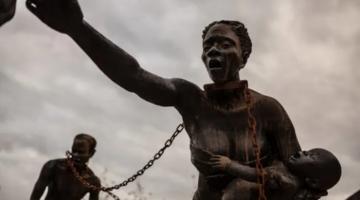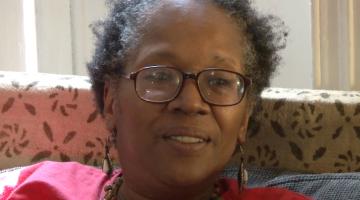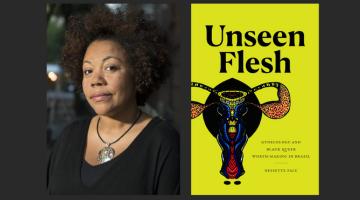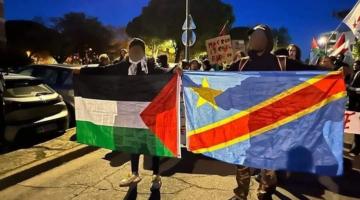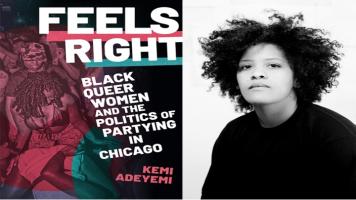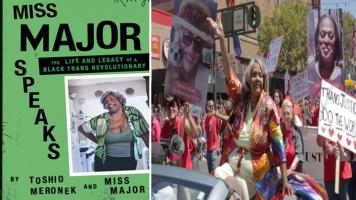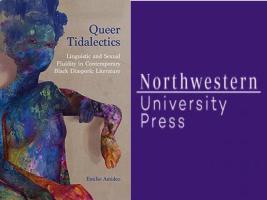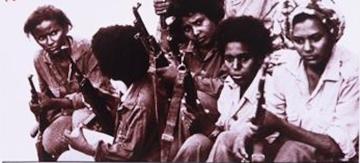In this series, we ask acclaimed authors to answer five questions about their book. This week’s featured author is Alan Pelaez Lopez. Dr. Lopez is an assistant professor at the University of California, Davis. Their edited book is When Language Broke Open: An Anthology of Queer and Trans Black Writers of Latin American Descent.
Roberto Sirvent: How can your book help BAR readers understand the current political and social climate?
Alan Pelaez Lopez: In the United States, what we now know as “#BlackLivesMatter” originated with the political organizing of Alicia Garza, Patrisse Cullors, and Opal Tometi both on social media and in their own local communities. #BlackLivesMatter first appeared online to instill hope, care, and a sense of futurity toward Black communities after the acquittal of George Zimmerman (a Peruvian-German American) in the murder of Trayvon Martin. In the Latin American and Latinx communities, questions regarding the validity of a movement promoting pro-Blackness were raised as if imagining a future where Black people are safe negatively impacted Latin America and the Antilles. Not to say that Black Latinxs and Black Latin Americans were erased by non-Black Latinxs in their critiques of the social movement. Furthermore, there was little conversation about the fact that a Latinx person (Zimmerman) who aligns with white supremacy murdered an underage Black American youth. When Language Broke Open highlights and centers the realities of Black LGBTQIA+ people of Latin American descent who must grapple with their racialized erasure in mainstream Latin American, Latinx, and Hispanic letters, media, and politics. The volume is also coming out in the era of book banning which targets work that addresses white supremacy, transgender futures, and conversations that gesture toward and/or center the legal discipline of critical race theory; the volume attends to the three themes.
What do you hope activists and community organizers will take away from reading your book?
When Language Broke Open is organized into three sections: memory, care, and futures. In the memory section, writers, and visual artists grapple with living in diaspora, some who were either forced to migrate out of their birth countries and some who have not yet been to their heritage country. Through attending to memory, each contributor realizes that despite being in diaspora, they can still re-imagine community, tradition, and belonging. The volume gives language to memory-work as transformational work. In the care section, community accountability, reunification, and reconciliation seem to appear often. In sharing stories of loss, betrayal, love, pleasure, and sexual intimacy, contributors allude to care as a political position that is as important (and at times more important) than organizing around policy change, and laws of inclusion.
From an organizing perspective, the futures section of the volume might help folks who are interested in political development and/or cultural organizing. There are a series of essays that help us imagine the necessary steps we can take for queer and trans Black kin to flourish. I want to share a section of Qui Alexander’s essay “‘A Rewiring of the Senses’: Considering Abolition” below because I think it gets readers into a space where it is possible to transition from reading to community organizing. Alexander writes:
"What does one do with the collective, intergenerational grief of being subject to dehumanization? Where do we teach that in textbooks? How does that feel in your body? Where do we teach about the emotional/spiritual inheritance of the Black diaspora? Where do we teach about what to do with that inheritance? What do we do with that? Abolition holds space for us to engage these questions. My heart breaks and swells, each time growing thicker with possibility."
Each question posed by Qui Alexander brings us to a critical dialogue we can (and I’d argue, must) facilitate with those we organize alongside with and those who we see as part of our kinship units.
We know readers will learn a lot from your book, but what do you hope readers will un-learn? In other words, is there a particular ideology you’re hoping to dismantle?
I want readers to understand Blackness as a multidimensional experience that changes country by country, zip code by zip code, and as a racial identity that is always informing gender and sexuality. While editing the volume, I was living in my birth country, Mexico, and I was attempting to read work by Black Latin American scholars. However, when I visited bookstores and libraries, I was often recommended work by Black American writers whose books were translated in Spanish. There is an immense number of Black artists and intellectuals in Latin America and the Caribbean and I was often heartbroken that their books were not carried in Mexico. I want this volume to make a dent in the study of the Black Latin American and Black Antillean diasporas and help others un-learn the idea that everyone experiences a Black life in the same way.
Which intellectuals and/or intellectual movements most inspire your work?
In the volume, I draw, cite, and extend on the work of Ochy Curiel whose early activism includes co-planning and co-hosting the Primer Encuentro de Mujeres Negras de América Latina y El Caribe. Curiel is a Dominican lesbian scholar based in Colombia who continually publishes critical essays on anti-colonial epistemologies and Black queer feminism in Latin America and the Antilles. Yolanda Arroyo Pizarro is a Puerto Rican, lesbian writer who both contributed to the volume and whose work was foundational for me while drafting the call for submissions of When Language Broke Open. Gloria D. Wekker’s writings from an Afro-Surinamese, lesbian position helped me think transnationally about gender and race, and I highly recommend her critical theory. Quince Duncan is a creative writer born in Costa Rica whose work helped me understand the genres of flash fiction and short story. Lady Dane Figueroa Edidi is a trans Indigenous Nigerian- Cuban writer whose creativity and world-building carried me as I edited. Iki Yos Piña Narváez, a trans Venezuelan writer and visual artist now based in Spain, also rang in my ear and heart throughout the process.
Which two books published in the last five years would you recommend to BAR readers?
In 2021, Gold Line Press in partnership with the University of Southern California published a fiction chapbook by Dominican queer writer Alejandro Heredia. You're the Only Friend I Need tells four stories about the power of friendship and relationality. Although Heredia has a non-fiction essay in When Language Broke Open, his debut fiction chapbook is a necessary read for those who are thinking about the ethics of writing queer Black Dominican characters, im/migration, and the realities of bullying and queer adolescence. I have been a little fearful of writing short stories and studying Heredia's work has made me excited to explore the genre. You're the Only Friend I Need should be essential in any class in Black Studies, Queer and Trans Studies, and Fiction Writing Workshops.
Tiempo de diablos: Usos de la cultura y el pasado en el proceso de construcción étnica de los pueblos negros afromexicanos is the first book by one of my favorite scholars of Afro Latin America, Itza Amanda Varela Huerta. Published by Centro de Investigaciones y Estudios Superiores en Antropología Social, the book traces Black Mexican racial formations through cultural work/production. Varela Huerta’s attention to dance, choreography, and self-identification places Black Mexicanidad at the center, disproving the narrative that there is no Black / Afro presence in Mexico. I’ll be teaching excerpts of the book in my Afro-Mexican and Afro-Chicanx Identity and Culture seminar at UC Davis this winter. It is my hope that I can also use the collection in my creative practice.
Roberto Sirvent is editor of the Black Agenda Report Book Forum.

